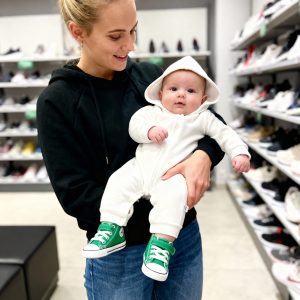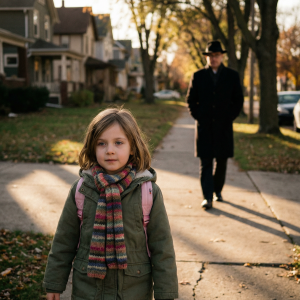In an opulent Chicago high-rise, where every surface reflected clinical perfection, Richard Thornton’s residence resembled a museum more than a home filled with warmth. The expansive space, featuring panoramic windows and stark contemporary furnishings, contained a existence meticulously arranged yet devoid of happiness. His nine-year-old son, Nathan, had remained silent and motionless for years, wheelchair-bound following a devastating accident that took his mother’s life. Medical professionals had reached their limits, their verdicts stark and absolute. Hope had gradually faded, replaced by mechanical routine and quiet acceptance. However, on an ordinary Tuesday morning, everything changed when Richard arrived home unexpectedly and observed something remarkable: their housekeeper, Elena, dancing with Nathan.
For the first time in years, Nathan’s eyes sparkled with life, following her every movement. What started as a brief moment of connection ignited a journey through silence, sorrow, and concealed revelations, exposing the transformative power of human connection. This is a tale of unexpected miracles, devastating grief, and the bravery to move forward once more.
The morning progressed with characteristic efficiency in the Thornton penthouse. Household staff arrived punctually, their interactions brief and businesslike, their actions measured and subdued. Richard Thornton, the ambitious founder of Thornton Technologies, had departed for an executive breakfast meeting before sunrise, pausing only to notice the untouched meal tray beside Nathan’s door. The child hadn’t eaten again. He seldom did.
Nathan Thornton, nine years old, hadn’t uttered a word in nearly four years. A spinal trauma from the collision that claimed his mother, Catherine, had left him paralyzed below the waist. Yet it wasn’t the wheelchair or the silence that tormented Richard most deeply—it was the hollow emptiness in his son’s green eyes. Not grief, not rage, simply a vacuum where vitality once flourished. Richard had poured millions into revolutionary treatments, experimental neurological procedures, and immersive virtual reality systems. None had succeeded. Nathan spent each day positioned beside the identical window, bathed in the same filtered sunlight, gazing out at a metropolis that seemed to progress without him. The doctors termed it emotional withdrawal. Richard perceived it as his son trapped in a prison he couldn’t unlock, regardless of his efforts.
That particular morning, a canceled appointment—a London client grounded by fog—cleared Richard’s calendar. With unexpected free time, he returned home, driven not by sentiment but by his compulsive need to maintain control. The elevator whispered as it transported him to the penthouse level, and he emerged, already mentally organizing messages and contracts. Then he detected it: melody. Not the ambient soundscapes programmed throughout the penthouse’s audio system, but something organic, heartfelt, and vibrant—a flowing waltz, imperfect yet full of soul.
Richard stopped cold, his Italian leather shoes soundless on the polished floor. He advanced toward the source, each step deliberate, as if approaching something precious. The melody grew stronger, a tender tune weaving through the atmosphere. Then came another sound, one that halted his breathing: motion. Not the mechanical whir of appliances or the rustle of cleaning materials, but something graceful, almost choreographed.
He reached the main room and saw her. Elena, their housekeeper, was spinning barefoot across the marble, her movements gentle and unhurried. Morning light poured through the opened blinds, creating golden bands that seemed to dance with her. In her left hand, she held Nathan’s, his tiny fingers loosely wrapped around hers. She guided his arm in a smooth arc, as if he were her dance partner. Her steps weren’t theatrical or showy—they were personal, natural, like a dialogue without speech.
But it wasn’t Elena’s elegance that anchored Richard to his position. It was Nathan. His son, the boy who hadn’t acknowledged anyone in years, was observing her. His head tilted slightly, his eyes following her every gesture with an intensity Richard hadn’t witnessed since before the tragedy. Nathan’s attention was engaged, aware, connected to the present moment.
Richard’s breath hitched, his vision blurring with unshed emotion. He remained there, frozen, as the music softened and Elena turned toward him. Her expression was serene, almost knowing, as if she’d sensed his presence from the beginning. She didn’t immediately drop Nathan’s hand. Instead, she stepped back gradually, lowering his arm with tenderness, as if gently guiding him from a beautiful dream. Nathan’s gaze moved to the floor, but it wasn’t the vacant stare Richard recognized so well. It was gentler, like a child who’d played joyfully and needed a moment to transition.
“Mr. Thornton,” Elena said with a slight nod, her voice steady, without apology.
Richard parted his lips, but words wouldn’t come. His throat constricted, his thoughts a whirlwind of shock and wonder. Elena turned away, collecting her supplies, humming quietly as if the moment had been commonplace. Richard stood motionless, the foundation beneath him seeming unstable, as if reality had shifted without warning.
His mind raced frantically. Was this inappropriate? A miracle? Did Elena possess some secret training? Who had given her permission to interact with his son? Yet none of these concerns matched the significance of what he’d observed. Nathan had been present, engaged, for the first time in years. It was genuine, undeniable, more concrete than any medical evaluation or forecast.
Richard approached Nathan’s wheelchair cautiously, half-expecting the boy to withdraw into his familiar stillness. But Nathan didn’t retreat. His fingers curved slightly, a subtle tension in his arm, as if his muscles recalled their purpose. Then, barely perceptible, a sound emerged from Nathan—a soft melody, off-pitch but unmistakable, echoing the tune Elena had played.
Richard stumbled backward, his heart racing. His son was singing.
He remained silent for the remainder of the day—not to Elena, not to Nathan, not to the staff who sensed something had transformed in the atmosphere. He sequestered himself in his study, reviewing security recordings, needing to verify it wasn’t his imagination. The image seared into his memory: Elena spinning, Nathan watching, alive. He didn’t experience anger or elation—just something foreign, a disturbance in the stagnant waters of his existence. Not hope, not yet. Hope carried too much risk. But something had fractured, a silence interrupted not by words, but by movement.
That evening, Richard skipped his customary whiskey. He sat in darkness, the memory of the waltz replaying endlessly in his mind. The penthouse, once a shrine to grief, felt different. Alive, if only briefly.
The following morning demanded explanations, but Richard wasn’t prepared to confront them. He waited until the staff had scattered, the penthouse settling into its regular rhythm. Then he summoned Elena to his office. She entered with quiet dignity, her uniform pristine, her gaze unwavering.
“Explain your actions,” he said, his voice controlled and measured.
“I was dancing,” Elena responded simply, her hands clasped before her.
Richard’s jaw tensed. “With my son?”
“Yes,” she said, meeting his stare directly.
The silence that ensued was electric, charged. “Why?” he demanded, the word almost accusatory.
Elena’s eyes remained steady. “Because I witnessed something within him. A light. I played music, and his fingers responded. He matched the rhythm, so I danced with him.”
Richard stood, his voice gaining intensity. “You’re not a therapist, Elena. You lack credentials. You don’t touch my son.”
Her reply was immediate, calm yet resolute. “No one else touches him either. Not with joy, not with trust. I didn’t compel him. I followed his lead.”
Richard paced, her composure disturbing him more than defiance would have. “You could have disrupted years of treatment,” he said, mostly to himself. “There are protocols, systems.”
Elena remained quiet, her presence a subtle challenge. He faced her, his voice sharper now. “Do you comprehend what I’ve invested in his care? What the specialists recommend?”
“Yes,” Elena said, her tone softer but deliberate. “Yet they don’t see what I observed yesterday. He chose to participate, with his eyes, with his spirit. Not because he was instructed to, but because he desired to.”
Richard felt his defenses crumble, not from agreement but from confusion. This didn’t align with any framework he understood. “You believe a dance heals trauma? A smile resolves everything?”
Elena didn’t respond directly. Instead, she said, “I danced because I wanted him to experience something. Because no one else has tried.”
The words struck harder than intended. Richard’s hands clenched, his mouth dry. “You overstepped boundaries.”
“Perhaps,” she said with a single nod. “But I would repeat it. He was alive, Mr. Thornton, even if only momentarily.”
The honesty of her statement hung between them, raw and uncompromising. Richard nearly dismissed her then, the impulse to restore order burning in his chest. But her final sentence stopped him: He was alive. He dismissed her with a brusque gesture, and Elena departed without another word.
Alone, Richard stared through the window, his reflection faint in the glass. He didn’t feel triumphant. He felt exposed, as if Elena had seen through the barriers he’d constructed around himself and his son. She hadn’t pleaded to remain or justified herself beyond stating what she witnessed in Nathan—something Richard hadn’t seen in years. It was as if she’d spoken directly to the wound he’d buried beneath logic and control.
That night, Richard poured whiskey but didn’t drink it. He sat on his bed’s edge, the rhythm of Elena’s waltz lingering in his mind like a pulse. He tried to remember the last time music had filled this house, not as therapy but as life. Then it struck him: Catherine. His wife. She’d loved dancing, not with precision but with abandon. Barefoot in their previous apartment, spinning toddler Nathan, humming melodies only she knew. Richard had danced with her once, after Nathan’s first steps, feeling clumsy but liberated. That was before the accident, before the silence.
He hadn’t danced since. He hadn’t allowed himself. But tonight, in his room’s quietude, he swayed slightly, caught between memory and possibility.
Richard rose and walked to Nathan’s room, opening the door softly. Nathan sat in his wheelchair, facing the window as always. But the atmosphere felt different. Richard stepped closer, listening. A faint sound came from Nathan—not from speakers, but from his own lips. A melody, soft and wavering, the same tune Elena had played.
Richard’s chest tightened. He stood frozen, afraid to disturb the fragile moment. Nathan didn’t turn, but continued humming, rocking gently in his chair. Richard realized he’d always searched for signs of life in his son—he’d simply stopped believing he’d find them.
Back in his room, Richard didn’t sleep. Not from stress, but from the weight of possibility. Elena had accomplished something no specialist had: she’d reached Nathan, not with science but with something riskier—emotion. It terrified him, but it also stirred something he wasn’t ready to name. Hope, perhaps. A crack in the armor he’d worn for years.
Elena returned the next day under strict guidelines: cleaning only, no music, no dancing. Richard delivered the rules without meeting her gaze, his voice flat. “Understood,” Elena said with a nod, taking her supplies and moving with the same quiet grace.
There was no argument, no tension, just an unspoken understanding that something sacred had occurred and now required protection. Richard told himself it was caution, that repeating the dance might disrupt Nathan’s delicate progress. But deep down, he knew he was protecting himself. He wasn’t ready to admit how much Elena’s presence had transformed their world.
He observed her now, from the corridor, through a partially open door. Elena didn’t speak to Nathan or acknowledge him directly. She hummed softly as she worked, melodies that felt timeless, rooted in memory rather than notation. Initially, Nathan remained still, his chair by the window, his face blank. But Elena didn’t demand miracles. She cleaned with a gentle rhythm, her movements fluid, almost like dancing itself.
One afternoon, something small occurred. As Elena swept past Nathan, her melody shifted to a minor key. His eyes flicked toward her, just briefly. She didn’t react, continuing her work as if nothing had happened. The next day, it happened again—his gaze lingered longer. A few days later, he blinked twice when she turned, deliberate and meaningful.
It was a silent conversation, built on glances and rhythm. Richard watched, morning after morning, from behind the wall, telling himself he was observing, analyzing. But he wasn’t waiting for Elena to fail anymore. He was hoping she’d continue.
Elena never forced anything. She offered presence, a steady rhythm Nathan could choose to follow. Sometimes she left a colorful cloth on the table, and Nathan’s eyes would drift toward it. Once, she tapped a pen softly against a cup, the sound barely audible but rhythmic. Nathan’s foot twitched, just once, then stilled.
These weren’t breakthroughs in the clinical sense, but they were something deeper—proof that connection was a process, not a result. Richard found himself lingering longer each day, his breathing syncing with Elena’s melodies. He tried explaining it to Nathan’s therapist once, but the words felt inadequate. How could he describe a housekeeper becoming a guide? How could he call a foot twitch a milestone? The experts would dismiss it as unscientific. Richard didn’t care. He’d learned not to underestimate the power of small things.
Elena treated these moments like seeds, nurturing them with patience, trusting something was growing beneath the surface. She left at the end of her shifts with a nod, as if she hadn’t just shifted the day’s meaning. It frustrated Richard, the quiet power she carried so humbly. He wondered where she’d learned those melodies, who had sung them to her. But he never asked. Reducing her to an explanation felt wrong.
On the sixth day, Nathan tracked Elena’s movements three times in one morning. Once, Richard swore he saw a faint smile, just a twitch in Nathan’s cheek. Elena noticed but didn’t comment, letting the moment exist without fanfare. As she gathered her supplies to leave, she paused at the table and placed a folded napkin near Richard’s chair. She glanced toward the hallway, knowing he was watching, and left.
Richard waited until she was gone to approach. The napkin was plain, one of many in the penthouse. But on it was a pencil drawing, simple but deliberate: two stick figures, one tall, one small, their arms curved mid-spin. The tall figure had long hair, the small one a round head. Richard’s throat tightened. He didn’t need to ask who had drawn it. The lines were shaky, smudged in places, but it was Nathan’s—his son, who hadn’t drawn or communicated in years. This was his memory, his offering.
Richard held the napkin, the simplicity cutting deeper than any photograph. He could see it clearly: Elena spinning, Nathan’s hand in hers. He didn’t frame the drawing or call anyone. He placed it back on the table and sat beside it, letting it speak what his son couldn’t.
The therapy session began as usual, with clinical precision and quiet detachment. Nathan sat across from his speech therapist, a compassionate woman named Dr. Mills who’d been visiting for years with minimal progress. She used visual cards, gentle prompts, and endless patience, but responses were rare. Richard watched from behind a glass partition, arms crossed, expecting nothing new. Dr. Mills’s assistant, a nurse named Janet who’d been with them since the accident, sat nearby, taking notes and occasionally glancing at Nathan with quiet hope.
Then the elevator chimed, and Elena entered, holding a soft, faded scarf. She didn’t speak, standing at the room’s edge until Dr. Mills noticed her. There was a brief pause, but no objection. Elena nodded to Janet, then stepped forward. Richard leaned closer to the glass as Elena approached Nathan, holding up the scarf and letting it sway like a gentle wave.
“Want to try again?” she asked, her voice soft but clear, an invitation without pressure.
The room stilled. Dr. Mills hesitated, unsure whether to intervene. Janet’s eyes darted between Elena and Richard, gauging the moment. Then Nathan blinked. Once. Then again. Two slow, deliberate blinks—his way of saying yes.
Dr. Mills gasped softly. Richard’s hand fell from his mouth, a sound escaping him—half laugh, half sob. He turned from the glass, unable to bear being seen. Nathan had understood. He had answered.
Elena didn’t celebrate. She smiled, not at Nathan but with him, and began looping the scarf around her fingers, letting it flutter near his hands. She didn’t rush, letting him set the pace. After a few passes, his hand twitched—not a reflex, but a choice. He didn’t grasp the scarf, but he acknowledged it. Dr. Mills stepped back, watching silently as Elena and Nathan spoke a language only they understood.
Richard remained behind the glass, his body rigid but his face transformed—vulnerable, awed. For years, he’d paid experts to unlock his son, and here was Elena, a housekeeper with no credentials, coaxing a response with a scarf and a smile. It wasn’t dramatic, but it was revolutionary, a quiet rebellion unfolding one blink at a time.
After the session, Elena tucked the scarf into her bag and returned to her duties without a word. Richard didn’t follow. His emotions hadn’t caught up to what he’d witnessed. For a man who built companies on control, he felt powerless in the face of this moment.
That night, as Elena prepared to leave, she found a note tucked between her cleaning supplies. A small square of paper, typed, no signature. Just four words: Thank you. R.T. She read it twice, then slipped it into her pocket, her face unreadable but her heart full.
Not everyone was pleased. The next day, as Elena sorted linens in the utility room, Janet approached, her expression kind but firm. “You’re walking a fine line,” she said, folding towels with deliberate care. “It’s beautiful what you’re doing, but this family’s been broken for years. Stirring things up might bring pain along with the healing.”
Elena paused, her hands still. “I know what I’m doing,” she said. “I’m not trying to fix him. I’m giving him space to feel.”
Janet hesitated. “Just be careful,” she said. “You’re touching wounds you didn’t cause.”
There was no judgment in her voice, only concern, born from years of watching the Thorntons unravel. Elena placed a hand on Janet’s arm. “That’s why I’m here,” she whispered, her eyes steady.
Later, alone in the supply closet, Elena held the scarf—her grandmother’s, smelling faintly of lavender and memory. She hadn’t brought it for Nathan or for show, but as a reminder that gentleness could break through stone. She’d seen Nathan’s blink, his spark, and though Richard hadn’t said more than those four words, she felt his walls shifting, letting light in.
The next morning, Elena returned, humming a little louder. No one stopped her. The glass door where Richard often stood was now open.
It happened so quickly, yet it felt eternal. Elena knelt beside Nathan’s chair, adjusting a ribbon they’d used for a coordination exercise. Richard watched from the doorway, arms crossed, not out of coldness but as a shield against the emotions stirring within. The session had been gentle, with Elena letting Nathan guide the pace. His hand movements were steadier, more confident.
Then, as Elena gathered the ribbon, Nathan’s lips parted with purpose. A sound emerged, rough and cracked from disuse. “Elena.”
She froze, thinking she’d imagined it. But his lips moved again, softer now. “Elena.”
Two syllables, the first name he’d spoken in years. Elena’s breath caught, her body trembling. She dropped the ribbon. Richard stumbled back, his shoulder hitting the doorframe. He hadn’t expected sound, not ever.
He rushed forward, dropping to his knees beside Nathan’s chair. “Nathan,” he gasped. “Say it again. Say Dad. Can you say Dad?”
He cupped his son’s face, searching for his eyes. But Nathan’s gaze shifted away, a subtle flinch, retreating into silence. Richard had pushed too hard, too fast. Elena placed a hand on his arm, her touch grounding. “You’re trying to fix,” she said quietly. “He needs you to feel.”
Richard blinked, her words cutting through his desperation. There was no judgment in her gaze, only understanding. He opened his mouth, then closed it, his hand resting on Nathan’s. Elena turned to the boy, whose eyes had drifted to the floor, but his fingers twitched, a sign he hadn’t shut down completely.
“You gave him a reason to speak,” Richard whispered, his voice raw. “Not me.”
Elena met his gaze, her expression soft but firm. “He spoke because he felt safe. Not seen—safe.”
Richard nodded, the words sinking in. “But why you?” he asked, almost to himself.
“Because I didn’t need him to prove anything,” she said.
The rest of the day passed in near silence. Elena returned to her tasks, her hands trembling slightly as she worked. Richard stayed with Nathan, not speaking, just present. Janet checked in once, her eyes wide but silent. The penthouse’s silence now held anticipation, not dread.
Elena didn’t share what Nathan had said. It felt sacred, not hers to claim. That night, as Richard sat alone, he pulled a photograph from a drawer—a faded image of him and Catherine dancing, her laughter frozen in time. On the back, in her handwriting: Teach him to dance, even when I’m gone.
He’d forgotten those words, buried them under grief. He hadn’t believed dancing was possible. Until Elena. Until now.
Elena cried later, alone in the stairwell, not from sadness but from the weight of reaching Nathan. His voice, cracked and fragile, had torn something open in her. She didn’t linger after her shift, slipping into the night with his name echoing in her heart.
The storage room, untouched for years, drew Elena one morning. She hadn’t planned to organize it, but something—perhaps the photo Richard now kept on his desk, or Nathan’s growing responsiveness—pulled her there. As she moved boxes labeled Catherine Keep, a small drawer in an old cabinet creaked open, revealing a sealed envelope, yellowed, with feminine handwriting: To Richard Thornton, only if he forgets how to feel.
Elena’s chest tightened. She didn’t open it but carried it to Richard’s office that evening. He was there, distracted, his eyes on a document he hadn’t read.
“I found something,” she said, holding out the envelope.
Richard saw the handwriting and froze. “Where?” he asked, his voice hollow.
“In storage, behind a drawer marked Personal,” Elena said. “It was sealed.”
Richard took the envelope, his hands shaking. He opened it, his breath catching. Elena started to leave, but he stopped her. “Stay.”
She stepped back inside as he read, his face unraveling. “She wrote this three days before the crash,” he whispered, then read aloud, his voice trembling. “If you’re reading this, you’ve buried your heart too deep. Richard, don’t try to fix him. He needs someone who believes he’s still there, even if he never walks or speaks again. Just believe in who he is.”
His hands shook as he continued. “Maybe someone will reach him when I’m gone. I hope you let them.”
Richard folded the letter, his head bowing as sobs broke free—raw, unguarded. Elena didn’t speak, but placed a hand on his shoulder, not as a housekeeper or friend, but as someone who understood carrying another’s pain. Richard leaned forward, his cries releasing years of held-back grief. When he looked up, eyes red, he tried to speak but couldn’t.
“You don’t have to,” Elena said softly. “She wrote it for a reason.”
Richard nodded, understanding that some things needed recognition, not repair. He read the final line aloud, barely a whisper. “Teach him to dance. Even when I’m gone.”
Elena exhaled, the words echoing like a promise. Richard looked at her, his gaze softer. “She would have loved you,” he said, his voice hoarse.
“I think she already does,” Elena replied, her words carrying a quiet truth.
They stood in silence, the letter a bridge between past and present. Richard broke down, not from failure but from release, and Elena stood as witness, having handed him a piece of his past that opened a future.
Elena began bringing a ribbon, pale yellow and worn, letting Nathan track its movement. “This is just for us,” she told him, looping it around their hands. “No pressure. Let the ribbon lead.”
She moved slowly, guiding his arms, celebrating every small effort. Richard watched, no longer interfering, drawn to the ritual. It wasn’t therapy—it was a shared language. Nathan’s movements grew, his eyes meeting Elena’s more often, sometimes anticipating her motions.
One afternoon, as Elena stepped aside, Nathan moved—not just his arms, but his torso, a slight sway. His feet slid an inch across the floor. Elena froze, awed. “You’re moving,” she whispered.
Nathan looked at his feet, the ribbon still fluttering. He swayed again, deliberate. Not therapy. Dancing.
Richard entered mid-motion, intending to say goodnight. He stopped, seeing Nathan sway, Elena guiding without leading. The music wrapped them in a gentle rhythm. Richard’s mind tried to rationalize it, but his heart knew: this was his son, dancing.
He kicked off his shoes and stepped forward. Elena handed him the ribbon’s end. He stood behind Nathan, one hand on his shoulder, swaying with him. It was awkward, imperfect, but real. Richard felt his son’s courage, his own grief softening into hope.
Elena stepped back, letting them lead. No one spoke. The music was their communion. When it ended, Richard knelt before Nathan, their eyes meeting. “Thank you,” he said, his voice breaking.
Nathan didn’t speak, but his gaze held everything. Elena placed the ribbon in Nathan’s lap, her silence validating the moment’s truth.
Richard approached Elena later in the utility room. “I want you to stay,” he said, his voice raw. “Not just as a housekeeper. As part of this.”
Elena paused, setting down a towel. “I don’t know what to say,” she admitted.
“You don’t need to answer now,” Richard said. “This place feels alive with you here. For him. For me.”
Elena nodded, her eyes searching. “There’s something I need to understand first,” she said softly.
That night, at a charity gala in the penthouse’s ballroom, Elena stood in the back, unnoticed in a simple dress. A donor unveiled a photo of Richard’s father, William Thornton, shaking hands with a woman who looked strikingly like Elena’s mother. The plaque read: William Thornton, 1987, Education Initiative, Mexico.
Elena’s heart raced. Her mother had spoken of a man with sharp eyes and quiet kindness. She said nothing, but the image haunted her. The next evening, she slipped into William’s old study, searching carefully. Behind a shelf, she found an envelope: For my other daughter.
Inside, a birth certificate: Elena Martinez. Father: William James Thornton. A letter followed, short but heavy. If you find this, I hope it’s the right time. I wasn’t brave enough to know you. I hope you found what you needed.
Elena’s breath caught. She didn’t confront Richard immediately. The truth felt like gravity, settling slowly. Later, she stood in his study, holding the envelope. “You should see this,” she said.
Richard read it, his face paling. “I don’t understand,” he whispered. “He never told me.”
Elena nodded. “Half-sister,” she said. “But yes.”
Silence held them, heavy but not broken. Richard sat back, stunned. “You’re the woman with my father’s eyes,” he said, awe and regret in his voice.
“I always wondered where they came from,” Elena replied softly.
The truth reshaped everything, revealing a bond neither had sought but both now felt. The next morning, Richard stopped Elena as she entered. “Elena,” he said, his voice raw. “You’re my sister.”
She exhaled, a weight lifting. “I was just a housekeeper,” she whispered. “I didn’t mean to uncover your past.”
She turned to leave, needing space. For days, the penthouse felt hollow again. Nathan regressed, his humming gone, his movements slow. Richard tried to keep the rhythm, but it felt empty. He reached for his phone to call Elena but stopped, unsure how to ask her back.
On the fifth day, Elena returned, kneeling beside Nathan, her hands on his. She didn’t speak to Richard, but reached for his hand, placing it in Nathan’s. “Let’s start over,” she whispered. “Not from the beginning. From here.”
Richard nodded, the past unchangeable but the future open. The music played, and the three of them—Nathan, Elena, Richard—swayed together, connected not by blood or duty, but by choice.
Months later, the penthouse was alive. Music filled the halls, from soft jazz to lively salsa Elena taught Nathan to hum. Laughter echoed, from visiting children and volunteers. The Thorntons had founded the Movement Center, a program for children with disabilities, focused on expression, not just recovery. It was born from Nathan’s journey, built by Richard and Elena together, not as CEO and housekeeper, but as family.
On opening day, the grand hallway was transformed, chairs lining the sides, filled with parents, doctors, and children. Richard, sleeves rolled, stood nervously beside Elena, who wore a simple dress, her hand near Nathan’s. Janet watched, eyes shining.
“You don’t have to do anything,” Elena told Nathan, meeting his gaze. “You’ve already done it.”
“But if you want to, we’re here,” Richard added, kneeling beside him.
Nathan gripped his walker, paused, then stood. The room stilled. His steps were slow, deliberate—a shift, then a stride. On the third, the crowd held its breath. At the marked spot, he stopped, straightened, and bowed with quiet grace. Applause erupted, unrestrained.
Nathan reached for the yellow ribbon, held it up, and spun—a slow, proud circle. The crowd roared. Richard stepped forward, tears streaming, his hand on Nathan’s shoulder. Elena stood beside them, trembling but silent.
“He’s her son too,” Richard whispered to Elena.
She nodded, a tear falling. Her hand found Richard’s, and they stood together—Elena, Richard, Nathan—a circle complete. The music swelled, children clapping, parents joining, a spontaneous dance filling the hallway. The penthouse, once a place of grief, was now alive with joy.
Silence, once a cage, had become a dance floor.





